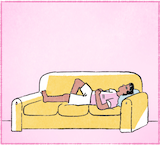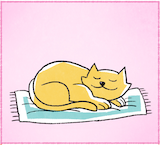



พุซายคนนี้เขากำลังเฮ็ดหญังอยู่ เขากำลังนอนอยู่
อาดสินอนหลับอยู่ นอนอยู่เทิงโซฟา โซฟาอันบักใหญ่พุ้นแหล้ว โซฟาสีเหลียง
เขากะนอนอยู่พุเดียวของเขานั้นหละ นอนซันขา ขึ้นขาหนึ่งพุ้นแหล้ว ขาหนึ่งกะเหยียดตงที้ลี้พุ้นแหล้ว มืออีกข้างหนึ่งเขากะวางอยู่เทิงอกของเขาเนาะ แล้วกะกำลังนอนอยู่ คือสินอนแซบ นอนนัวคักเนาะ เหลียวเบิ่งนอนหลับ บ่ฮอดมืนตาซ้ำ
แล้วพุซายคนนี้เขานอนเฮ็ดหญัง กะจักหละเด้อ จักว่าเขานอนเฮ็ดหญัง เขากะอาดสิเมี่ยย อาดสิล้า อาดสิมาจากหม้องเฮ็ดงาน อาดสิเซาเมี่ยยกะได้ เขากะเลยนอนหลับ ปะมานนั้นเนาะ
12
เขากำลังเฮ็ดหญัง กะมีพุซายพุหนึ่งนั้นหละ เขากำลังนอนอยู่ นอนอยู่เทิงโซฟา นอนอ่านหนังสือเนาะ
มือสองข้างจับหนังสือเหล้มหนึ่งขึ้นมา แล้วกะซันที้ลี้ขึ้น แล้วกะกำลังแนมเบิ่ง อาดสิอ่านเบิ่ง หลือว่าอ่านหนังสืออยู่กะได้เนาะ
ขาของเขาข้างหนึ่งกะซันขึ้น ขาข้างหนึ่งกะเหยียดที้ลี้ ตงที้ลี้ไปพุ้นหละเนาะ
13
อันนี้เป็นสัด สัดชะนิดหนึ่งเนาะ เป็นเสีย เขาเอิ้นว่าเสีย เสียกะเป็นสัดชะนิดหนึ่งนั้นหละ
เสียนี้เป็นสัดดุล้ายบ่ หลือว่าดุ หลือว่าฮ้ายคักบ่ ฮ้ายคักเด้อสัดหนิ เสียเนี้ย ฮ้ายคัก
มันกินเนี้ยเป็นอาหาน กินเนี้ยเป็นอาหานเนาะ
เบิ่งลักสะนะท่าทางหลือว่าของแท้เนี้ย มันเป็นตาย้านบ่ ปัดโท เป็นตาย้านคักเด้อ เป็นตาย้านอี่หลี เสียนี้ บ่ก้าอยู่ใก้ พุใดกะบ่ก้าอยู่ใก้มันดอก เพาะว่ามันตาย้าน ตาย้านคักอี่หลี
14
อันนี้คืออี่หยัง อันนี้เป็นแมว อันนี้คือแมว
แมวมันกำลังนอนอยู่ นอนหลับ ตุ้ยพุ้นแหล้ว บ่เบิ่งหน้า บ่เบิ่งหลัง บ่เบิ่งฟ้าเบิ่งไฟอี่หยังเลย นอนอยู่โตเดียวข้อหล้อของมันนั้นหละ คือสิมีความสุขหลาย
แล้วมันนอนเฮ็ดหญัง มีคือสิเมี่ยย มันคือสิเซาเมี่ยยนั้นหละ มันกะเลยนอนเนาะ
Link to overview page
Link to dictionary
| Isaan | Pronunciation | Tones | Thai | English/Notes |
|---|---|---|---|---|
| พุซาย | phu-sa:i | H-HR | ผู้ชาย | man, male |
| คน | khon | HR | คน | person, people |
| นี้ | ni: | HF | นี้ | 1. this 2. here |
| เขา | khao | M | เขา | personal pronoun: he, she |
| กำลัง | gam-laŋ | M-HR | กำลัง | auxiliary indicating continuous or progressive action |
| เฮ็ด | het | H | ทำ | to do, to make |
| หญัง | ɲaŋ | M | อะไร, เป็นหญัง = ทำไม | 1. what {เขากำลังเฮ็ดหญัง = What is he doing?} {ธูปเอาไว้เฮ็ดหญัง = What are incense sticks for?} 2. something, anything, (nothing) 3. เป็นหญัง[...]คือ in initial position: why {เป็นหญังเขาคือใส่บักพิกลงไปในกวยเตียว = Why is he putting chili in [his] noodle soup?} {เป็นหญังหน้าต่างมันคือเปิด = Why is the window open?} {เป็นหญังมันคือมีควนไฟ = Why is there smoke?} |
| อยู่ | yu: | H | อยู่ | 1. to be (located) at 2. yet, still 3. auxiliary indicating continuous or progressive action {ทอดปาอยู่ในกะทะ = (in the process of) frying a fish in the pan} {แม่กำลังเมี้ยนเฮียนอยู่ = mother is cleaning/tidying up the house} |
| นอน | nɔ:n | HR | นอน | 1. to lie down 2. to sleep |
| อาด | a:t | LF | อาจ | 1. might, may, will 2. likely |
| สิ | si | M | จะ | future tense auxiliary {เขากำลังสิตื่น = he's about to wake up} {สิไปตะหลาด = [I'm] going to the market} |
| นอนหลับ | nɔ:n-lap | HR-M | นอนหลับ | to sleep |
| เทิง | thə:ŋ | HR | บน | 1. on, on top of, at, in {เทิงโต่ะ = at/on the table} {กบมันนั่งอยู่เทิงใบบัว = the frog is sitting on the lotus leaf} {เทิงท้องฟ้า = in the sky} {มันแล่นอยู่เทิงลาง = [the train] runs on rails} {มีคนนั่งอยู่เทิงลดสามล้อสามคน = there are three people sitting in the tuk tuk} 2. up, upward Notes: pronunciation: also realized as ทัง |
| โซฟา | so:-fa: | HR-HR | โซฟา | sofa, couch |
| อัน | an | M | อัน | 1. thing, object 2. general clf. for objects |
| บัก | bak | M | 1. intensifier before adjectives {ปาโตบักใหญ่ = a (very) large fish} 2. prefix in front of fruits and vegetables {บักแตงโม = watermelon} 3. can be used as a reference for a male person of the same or younger age {บักอันนี้ = this lad} |
|
| ใหญ่ | ɲai | H | ใหญ่ | large, big |
| พุ้นแหล้ว | phun-lɛ:o | HF-LF | นู่นแหละ | auxiliary for emphasis at the end of a phrase Notes: variant of พุ้นหละ |
| สี | si: | M | สี | 1. color 2. colored pencil, crayon |
| เหลียง | li:aŋ | M | เหลือง | yellow |
| กะ | ga | M | ก็ | 1. then, consequently 2. also |
| พุเดียว | phu-di:ao | H-M | คนเดียว | 1. alone, by oneself {เขากำลังยืนอยู่พุเดียว = she's standing by herself} {เขานั่งอยู่พุเดียว = he's sitting by himself} 2. one person |
| ของ | khɔ:ŋ | M | ของ | of, belonging to |
| นั้นหละ | nan-la | HF-M | นั่นแหละ | auxiliary for emphasis at the end of a phrase |
| ซัน | san | HR | ชัน | to sit/lie with one's knees up |
| ขา | kha: | M | ขา | leg {ขาหน้า = front leg} {ขาหลัง = hind leg} {ส้งขาญาว = long trousers} |
| ขึ้น | khʉn | LF | ขึ้น | 1. to go up, to increase 2. sun: to rise {ตะเว็นกำลังขึ้น = the sun is rising} 3. more 4. bus/train etc.: to get on, to board {พุโดยสานขึ้นลดไฟเบิดแล้ว = all passengers have boarded the train} |
| หนึ่ง | nʉŋ | H | หนึ่ง | 1. one 2. after adjective: intensifier {บักคักหนึ่ง = very much} {อันบักใหญ่หนึ่ง = very large}, or attenuates the meaning {กะดาดมันแผ่นน้อยๆ หนึ่ง = the piece of paper is [relatively] small} |
| เหยียด | yi:at | LF | เหยียด | to stretch (out) |
| ตง | toŋ | M | ตรง | 1. at 2. to be precise at, to be exact {ห้าโมงตง = exactly five o'clock} 3. straight |
| ที้ลี้ | thi:-li: | HF-HF | ตรง | straight, extended |
| มือ | mʉ: | HR | มือ | 1. hand 2. front leg/paw (e.g., of a cat) |
| อีก | i:k | LF | อีก | 1. more, again 2. other, another |
| ข้าง | kha:ŋ | LF | ข้าง | 1. side {มีหูจับสองข้าง = there are handles on both sides} 2. next to {วางอยู่ข้างๆ ก่องใบใหญ่ = it's placed next to the large box} {เขายืนอยู่ข้างๆ อีกพุหนึ่ง = he's standing next to another person} 3. clf. for body parts which come in pairs (eyes, ears, legs etc.) {เขามีตาสองข้าง = she has two eyes} |
| วาง | wa:ŋ | HR | วาง | to place, to set/put down {โทละสับ/phone: วางสาย = to hang up} {มีเกิบวางอยู่ในก่อง = there are shoes in the box} {มือข้างหนึ่งเขาวางอยู่เทิงโต่ะ = he's put one of his hands on the table} |
| อก | ok | M | อก | chest Notes: see also เอิก |
| เนาะ | nɔ | H | เนาะ | final particle: makes the statement softer, looking for agreement |
| แล้ว | lɛ:o | HF | แล้ว | 1. finished 2. already 3. and then, and next (especially แล้วกะ) 4. auxiliary for past tense |
| คือ | khʉ: | HR | คือ | 1. to be, to resemble, like, as 2. why {บักหล้าคือบ่เก็บโต่ะแน่ = [addressing a young boy] Why haven't you cleared the table?} |
| แซบ | sɛ:p | HF | อร่อย | 1. food: tasty {กวยเตียวมันแซบบ่ = Is the noodle soup tasty?} 2. sleep: well {เป็นตานอนแซบคัก = it looks as if she's sleeping very well} |
| นัว | nu:a | HR | 1. delightful 2. delicious, goodtasting, tasty |
|
| คัก | khak | H | intensifier: very, very much | |
| เหลียว | li:ao | M | เหลียว | 1. to turn 2. to look |
| เบิ่ง | bəŋ | H | ดู | 1. to look at, to see, to watch {เบิ่งโทละทัด = to watch TV} {เบิ่งหนัง = to watch a movie} 2. to guess {เบิ่งซงแล้ว ... = [I] guess / from what it looks like ...} |
| บ่ | bɔ: | H | ไม่ | 1. no, not 2. question particle, transforming a statement into a question Notes: spelling exception in line with common usage on social media |
| ฮอด | hɔ:t | HF | ถึง | 1. to arrive, to attain {ฮอดจุดหมายปายทาง = (airplane, train etc.) to arrive at one's destination} {มันทันได้ฮอดหกโมงอยู่ = it's not yet 6 o'clock} 2. to, at {ผมญาวฮอดบ่าไหล่เอาโลด = long hair down to the shoulders} 3. about {บ่ได้เว้าฮอด = [I] haven't talked about [this]} {คนที่เฮาเว้าฮอดวั่งหั้นหละ = the person we've just talked about} |
| มืน | mʉ:n | HR | ลืม, เปิด | to open (the eyes) |
| ตา | ta: | M | ตา | eye {เขามีตาสองข้าง = he's got two eyes} {หลับตา = to close one's eyes} |
| ซ้ำ | sam | HF | อีก(เลย) | again, once more, anymore Notes: translation to be confirmed |
| จัก | jak | M | จัก | 1. answer to a question: [I] don't know, don't know exactly, [I'm] not sure {พุซายคนนี้เขาเถ้าไป่ จัก จักเถ้าหลือบ่เถ้า เบิ่งบ่ค่อยออก = Is this man here already old? I don't know. I can't see clearly whether he's old or not.} {เขาเว้ากันอยู่ใส จักคือกัน = Where are they talking? I don't know either.} 2. exact(ly), what exactly {จักต้มอี่หยังกะบ่ฮู้ = I don't know what (exactly) he is cooking} {บ่ลู้คือกันจักปาอี่หยัง = I don't know either what kind of fish this is} 3. how much/many? {ต้นไม้มีจักต้น = How many trees are there?} {ตอนนี้จักโมงแล้ว = What time is it now?} {มือของเฮานี้สิมีจักนิ้ว = How many fingers do our hands have?} 4. a bit, a little bit {จักหน่อย/จักหน่อยหนึ่ง = a bit, a little bit} |
| หละ | la | M | แหละ, ล่ะ | 1. auxiliary for emphasis at the end of a phrase 2. auxiliary to create a follow-up question: And what about ... ? {แล้วลดคันที่สองหละ = And what about the second car?} |
| เด้อ | də: | HF | final particle | |
| ว่า | wa: | H | ว่า | 1. that, as {คำว่า X = the word X} 2. to say |
| เมี่ยย | mi:ai | H | เมื่อย | 1. to be exhausted, tired 2. to feel stiff |
| ล้า | la: | HF | ล้า | to be exhausted, tired, weak |
| มา | ma: | HR | มา | 1. to come 2. auxiliary expressing action towards the present or focal time {กะคุเฮ็ดมาจากอี่หยัง = What is the bucket made of?} {แล้วเขากะเก็บเงินจากพุนั้นมา = and then she takes the money of that person} |
| จาก | ja:k | LF | จาก | 1. from {... เฮ็ดมาจากอี่หยัง = ... is made from what?} 2. to depart |
| หม้อง | mɔŋ | LF | ที่, แห่ง, บริเวณ | 1. place, area {หลายที่หลายหม้อง = in many places} {หม้องใดหม้องหนึ่ง = some place} 2. clf. for places |
| เฮ็ดงาน | het-ŋa:n | H-HR | ทำงาน | to work |
| เซา | sao | HR | จบ | 1. to stop, to be finished {น้ำมันเซาไหลแล้ว = the water has stopped flowing} {ฝนเซาตกแล้ว = it has stopped raining} {มันสิเซาเสียงดัง = (phone) it stops ringing loudly} 2. to prevent, to hinder 3. to rest {เซาเมี่ยย = to rest} |
| ได้ | dai | HF | ได้ | 1. can 2. to get, to obtain 3. before verb: indicating past tense 4. บ่ได้ + verb: not |
| เลย | lə:i | HR | เลย | 1. futher on, beyond, past {เข็มน้อยเลยเลขสิบสองไป = the minute hand has passed number twelve} 2. too much 3. at all 4. definitively 5. completely, utterly |
| ปะมาน | pa-ma:n | M-HR | ประมาณ | 1. about, approximatively 2. to guess, to estimate |
| นั้น | nan | HF | นั้น | that, there |
| มี | mi: | HR | มี | 1. to have 2. there is |
| พุ | phu | H | ผู้ | 1. person 2. clf. for people {พุหญิงพุหนึ่ง พุซายพุหนึ่ง = a woman, a man} {ซู่พุซู่คน = everybody} {พุหนึ่งโตจ่อยๆ พุหนึ่งโตบักอ้วนหนึ่ง = one person is slim, the other is fat} Notes: pronunciation: also realized as พู่- |
| อ่าน | a:n | H | อ่าน | to read |
| หนังสือ | naŋ-sʉ: | M-M | หนังสือ | 1. book {เลียนหนังสือ = to study} 2. text {เขียนหนังสือ = to write sth.} Notes: sentence-final: often with rising tone which is likely a Thai influence |
| สอง | sɔ:ŋ | M | สอง | two |
| จับ | jap | M | จับ | 1. to grasp, to hold {เขาจับมือกัน = they're holding hands} {เขายืนจับไอติมอยู่ = she's standing, holding an ice cream} 2. to catch, to arrest {จับพุล้าย = to arrest a criminal} |
| เหล้ม | lem | LF | เล่ม | clf. for books, notebooks |
| แนมเบิ่ง | nɛ:m-bəŋ | HR-H | มองดู | 1. to look at 2. to watch |
| หลือ | lʉ: | M | หรือ | or |
| ไป | pai | M | ไป | 1. to go 2. auxiliary indicating action extending into the future |
| พุ้นหละ | phun-la | HF-M | นู่นแหละ | auxiliary for emphasis at the end of a phrase Notes: see also พุ้นหนะ |
| เป็น | pen | M | เป็น | 1. to be, to exist 2. to be able to 3. to suffer, sth. happens to 4. เป็นหญัง[...]คือ in initial position: why? {เป็นหญังเขากะคือแปงฟัน = Why is he brushing his teeth?} {เป็นหญังเคี่ยงบินมันคือสิตก = Why is the airplane falling down?} |
| สัด | sat | M | สัตว์ | animal |
| ชะนิด | cha-nit | H-H | ชนิด | kind, type, species |
| เสีย | si:a | M | เสือ | tiger |
| เอิ้น | ə:n | HF | พูด, เรียก | to call, to say {เอิ้นง่ายๆ ว่า = in other words} {คนอี่สานเอิ้นว่า เป็นลูกคนกก = Isaan people call her ลูกคนกก} |
| ดุล้าย | du-la:i | M-HF | ดุร้าย | fierce, savage, dangerous |
| ดุ | du | M | ดุ | fierce, savage, unfriendly |
| ฮ้าย | ha:i | HF | ร้าย | fierce, savage, bad, evil, dangerous |
| หนิ | ni | M | นี่แหละ, เหรอ/หรอ | 1. particle used to emphasize a statement or form (or add to) a question {เป็นตาแซบคือหญังหนิ = it's really tasty} {เคี่ยงพอเท่าๆ หนิ = the [radio] is appropriately sized (i.e., not too large)} 2. variant of นี้ = this Notes: translation to be determined; maybe sometimes like Thai นี่แหละ; other examples given: อยู่ใสหนิ อยู่ตลาดหนิ กินเข้าไป่หนิ |
| เนี้ย | ni:a | HF | เนี้ย | variant of นี้ = this, here |
| มัน | man | HR | มัน | it (also used to refer to people) |
| กิน | gin | M | กิน | to eat, to consume, to use |
| เนี้ย | ni:a | HF | เนื้อ | meat Notes: pronunciation: also realized as เนื้อ |
| อาหาน | a:-ha:n | M-M | อาหาร | food {ญุงมันกินเลียดเป็นอาหาน = the mosquito feeds on blood} |
| ลักสะนะ | lak-sa-na | H-M-H | ลักษณะ | feature, characteristic, quality |
| ท่าทาง | tha:-tha:ŋ | H-HR | ท่าทาง | 1. expression, look, manner 2. gesture 3. posture, appearance |
| แท้ | thɛ: | HF | แท้ | truly, surely, really, indeed |
| ตาย้าน | ta:-ya:n | M-HF | น่ากลัว | scary, not safe |
| ปัดโท | pat-tho: | M-HR | โอโห | exclamation of surprise Notes: can be drawn out to ป๊าด-ถิ-โท, or otherwise (with possible tone changes) |
| อี่หลี | i:-li: | H-M | จริง | intensifier: really Notes: pronunciation: also realized as อี่หลิ |
| ก้า | ga: | HF | กล้า | 1. to dare 2. to be bold, fearless, brave |
| ใก้ | gai | HF | ใกล้ | near, close |
| พุใด | phu-dai | H-M | ใคร | 1. who {มีพุใดโทมากะบ่ลู้ = I don't know who has called} {ห้องนอนของพุใด = whose bedroom (is this)? } 2. someone, somebody, anybody, in negative context: nobody {บ่มีพุใดอยู่กับเขาเลย = there's nobody with him} |
| ดอก | dɔ:k | LF | หรอก, ดอก | 1. particle used after a negative, relativizing or explanatory statement to make the sense milder {กินเข้าบ่ บ่กินดอก = Are you going to eat [with us]? No.} {เป็นก้อนสี่เหลี่ยม ก้อนน้อยๆ ดอก = These are cubes, small cubes.} {แล้วกะมีลดคันหนึ่งขี่ผ่านมา เป็นลดเก็งดอก = And there's a car passing, a sedan.} 2. particle used to emphasize (not necessarily a negative) contrast 3. particle used for emphasis {ดอกไม้นี้งามบ่ กะงามอยู่ เบิ่งงามๆ ดอก = Is this flower beautiful? Yes, it's beautiful, it looks beautiful} |
| เพาะว่า | phɔ-wa: | H-H | เพราะว่า | because |
| อี่หยัง | i:-yaŋ | H-M | อะไร | 1. what {นี้คืออี่หยัง = What is this?} {มื้อนี้เจ้าเฮ็ดอี่หยัง = What are you doing today?} {กินเข้างายกับอี่หยัง = What did you have for breakfast?} 2. something, anything, (in negations) nothing {บ่ต้องเฮ็ดอี่หยังอีกเลยนอกจากใส่ปุย = [we] don't need to do anything besides adding fertilizer} |
| แมว | mɛ:o | HR | แมว | cat |
| ตุ้ย | tui | HF | exclamation of surprise | |
| หน้า | na: | LF | หน้า | 1. front {ปะตูหน้า = front door} 2. face {เขากำลังล้างหน้า = he's washing his face} 3. auxiliary: conditional tense {เขาหน้าสิเป็นพุบ่าวพุสาวกัน = they are probably groom and bride} {กะหน้าสิส้มอยู่ = it's likely to be sour} 4. season {หน้าฮ้อน = hot season} 5. page 6. clf. for pages {เฮาอ่านฮอดหน้านั้นแล้ว = we've read until this page} |
| หลัง | laŋ | M | หลัง | 1. back, after 2. back (of body) {ขี่หลังควย = to ride on a water buffalo} 3. clf. for houses {บ้านหลังใหญ่ = a large house} {เฮียนไม้หลังเก่า = an old wooden house} |
| ฟ้า | fa: | HF | ฟ้า | 1. sky {เคี่ยงบินมันกำลังบินขึ้นฟ้า = the airplane is taking off into the sky} 2. color: blue |
| ไฟ | fai | HR | ไฟ | 1. fire, flame 2. electricity, power 3. light |
| โต | to: | M | ตัว | 1. body, self 2. clf. for animals, characters/letters/consonants, appliances, clothes (e.g., pairs of trousers, shirts) |
| เดียว | di:ao | M | เดียว | only, alone, single |
| ข้อหล้อ | khɔ:-lɔ: | LF-LF | เท่านั้น, ขนาดนั้น, น้อยๆ | only {ต้นไม้มีต้นเดียว ต้นเดียวข้อหล้อ = there's one tree, only one tree} {มีบ้านหลังเดียวข้อหล้อ = there's only one house} |
| ความสุข | khwa:m-suk | HR-M | ความสุข | happiness |
| หลาย | la:i | M | เยอะ, มาก | many, much, very |